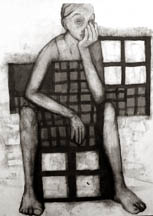|
observer |
|
|
|
|
|
OTHER LINKS |

|

|

|
Giving up the perks for better or for worse?:Down-scalingFlashback. You are in your teens. Someone asks you what you would like to be when you grow up. (a) a doctor (b) a teacher (c) a housewife. I doubt if you would ever tick the box next to housewife (regardless of your gender). Why? Because no one considers leaving a well-paid job to become a housewife as either glamorous, hot, or the "in thing". If any profession suffered from a bad image, it's surely this!
As Sheila Kumar writes in "View from the other side" the life of a downscaler, calls for a great deal of courage, especially when, in today's society an individual's self-worth is inextricably tied in with his or her earning power. Not easy to get off"In many ways, the dream came true". Writes Kumar. "The house was exactly as I dreamed of it, a 99-year-old cottage with parquet flooring, a wide gleaming staircase and even wild roses growing around. I would take walks along pine needle-laden paths, breathing in the oxygen-rich, eucalyptus-tinged air...a magic mantra with its own colour washed images". Yet, the dream doesn't last. The conditioning of the past years tends to overwhelm you till you feel like the man in the circus who rides a motorcycle in a steel sphere: once he's on, he's on and it isn't easy for him to get off." Like Kumar, every one who leaves their jobs to raise a family, follow a transferred husband, or to look after an ailing parent is forced to acknowledge a hoary truth: a cut in earning power is linked directly to a diminishing of confidence.
While out shopping, I trained myself to walk past the section advertising perfectly cut work jackets". Widening gulfIt's obvious that sooner or later, the gulf will start to yawn. When friends talk about ambitious targets reached, of glitzy parties and thought-provoking book readings, you tell them of rainy noons, of trying to make the perfect polos curry, of growing roses in the garden. And you realize life's simple pleasures are no longer so marvellous. You catch up on that pile of reading matter, Oblomove, War and Peace, and even Ulysses But always, there is this lurking fear that you would finish them ... and then what? According to Kumar, you shouldn't lose heart. Once you are clear in your mind that you are not likely to return to the regular workplace, you should not let the `then what' query assume an alarmingly large proportion in your life. You may not have a clear answer, but what you do have is a large reserve of (sometimes flagging) enthusiasm. And a determination to make the most of your time out. You have got yourself a life all right. You just need to work on it , says Kumar. Here is what Dr. Vijay Nagaswami, psychotherapist and relationships consultant, has to say on the issue. "Downsizing does affect the self-worth of a person, even if one makes a conscious choice to do so. The main reason for this is that today, we tend to derive our primary identity from work and in the absence of work; we tend to feel a sense of low self-worth. The positive benefits of downscaling takes us through for a short while (a kind of honeymoon period, as it were), following which, we tend to be filled with self-doubt until we realise that the original reasons for which we sought downscaling are really substantial ones. This usually happens when we find a substantial enough alternative." Dr. Nagaswami has a few pointers on how people should cope with the inevitable downs of downsizing, writes Kumar. "First " he says, "One should have a definite and specific plan of action (not something vague like `I will do what I've always wanted to do, like read `War and Peace'') before implementing our plans to downscale our lives." "Second, one needs to discuss the decision to downscale with all the members of one's support network so that they can remind one of the benefits when things look bleak. Finally, one should try and look around for alternative things to do, to fill at least part of the time one would have otherwise spent at work." And its not such a terrible thing after all. Not if you remember this phrase from the Raghuvamsa." Thou art the mistress of my house, my counsellor, my trustful friend in confidential matters and my dear pupil in lovely fine art. If this is what it means to stay at home, surely it's worth the sacrifice. |
 And they have a word for it. Downscaling; i.e giving up your
professional life in order to look after your spouse or raise a family.
And if you are worried this article is about guilt trips, women's lib
and much finger pointing, rest assured it is not, because more and more
men too are taking on the role of "stay-at-home" thaththa, even though
no one, not even their own off-spring considers this role as
"earth-shatteringly important".
And they have a word for it. Downscaling; i.e giving up your
professional life in order to look after your spouse or raise a family.
And if you are worried this article is about guilt trips, women's lib
and much finger pointing, rest assured it is not, because more and more
men too are taking on the role of "stay-at-home" thaththa, even though
no one, not even their own off-spring considers this role as
"earth-shatteringly important".  "I started to assimilate the word `compromise' into my lifestyle".
says Kumar. "I learned to do without a professional haircut or
haircolour job. I was able to suppress that slightly panicky feeling I'd
get upon reading the latest "How to clinch that promotion" story in one
of the many magazines I subscribed to.
"I started to assimilate the word `compromise' into my lifestyle".
says Kumar. "I learned to do without a professional haircut or
haircolour job. I was able to suppress that slightly panicky feeling I'd
get upon reading the latest "How to clinch that promotion" story in one
of the many magazines I subscribed to. 







